![]()
MEANING: prepare for trouble or hard times
IN CONTEXT: Here comes the boss and he’s in a bad mood. We’d better batten down the hatches.
Batten down the hatches is a nautical phrase that dates back to the early 1800s. Most sailing ships at the time had cargo holds that opened to the deck via hatches, sometimes called hatchways. These hatches were normally left open or simply covered with a grate that allowed for ventilation. When seas were rough or bad weather was imminent, the ship’s captain would call to batten down the hatches to protect the cargo and prevent the hold from getting filled with rain or seawater. The hatches would be covered with canvas tarpaulins that would be held down with strips of wood, known as battens, to stop them from blowing off.
![]()
MEANING: avoid a difficult situation by leaving abruptly
IN CONTEXT: The business was failing so instead of injecting more money, he decided to cut and run.
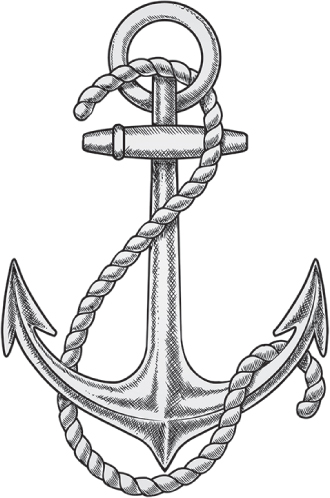
Cut and run originated in the early 1700s when the anchor cables of ships were made of rope. To raise an anchor took significant time and effort, especially in deep water. If a ship was at anchor and suddenly came under attack, the time taken to raise the anchor could be costly. To save time and escape with minimal damage, the crew would cut the anchor rope with an ax and allow the ship to run with the wind and escape to safety. The expression was being used figuratively by 1861 when Charles Dickens included it in his novel Great Expectations.
![]()
MEANING: the very best quality
IN CONTEXT: When it comes to universities, Princeton is first rate.
First rate is a naval expression dating from the time of King Henry VIII. It was during his reign that the British Navy began organizing its ships according to their size and strength. The warships were rated on a scale of one to six. A small ship with little armory was considered sixth rate, while a large and well-armed ship was classed as first rate. The expression soon came to be used to refer to anything of the highest quality.
![]()
MEANING: a nutritious meal
IN CONTEXT: Jenny had been dieting for a month so was really looking forward to a good square meal.
Square meal is yet another nautical phrase. British warships in the 17th century had poor living conditions: The quarters were cramped, and most meals were insubstantial. In particular, breakfast and lunch usually consisted of little more than bread and water. However, the final meal of the day did provide some sustenance and generally included some form of meat. This meal was served on a large square tray made of wood, designed in that shape for easy storage. This larger, more nutritious serving became known as a square meal.
![]()
MEANING: a request where you’re unlikely to receive what you want
IN CONTEXT: After buying lottery tickets for years without any luck, I figured I was better off whistling for it.
Whistle for it has its origins in a sailing superstition. Some sailors believed that they could summon the wind on a calm day by whistling for it. The hope was that the wind would blow in sympathy with the sailors and fill the sails so the ship could move on. Others disagreed and believed that whistling was devil’s music. They feared that whistling for the wind would result in a violent storm. Given that a gentle wind or a fierce storm rarely appeared, the expression came to mean what it does today.
![]()
MEANING: everything is fine and okay
IN CONTEXT: The IRS audited the company’s books but found that everything was hunky dory.
Hunky dory began with a group of American sailors in the 19th century. There was a major street in Yokohama, Japan, called Honcho-dori. It was well-known for housing ladies of ill repute, and when in port after a long voyage, the sailors would frequent the street to partake in the recreational activities being offered. Hunky, meaning “sexy,” was a play on the similar-looking word, Honcho, and when “dori” was added, a phrase was spawned.
![]()
MEANING: helpless; at someone’s mercy
IN CONTEXT: The police had captured the crime on camera, so they really had the accused over a barrel.
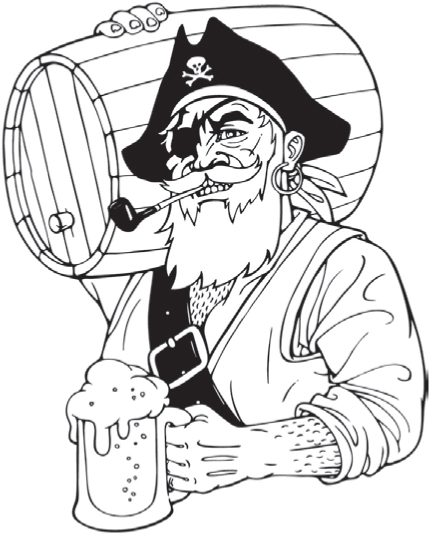
To have someone over a barrel alludes to the maritime practice of rescuing a drowning sailor. Once hauled from the water, the other crew members would place the sailor facedown over a barrel in order to empty his lungs of water. The sailor would be rolled back and forth in an attempt to expel the water. Being completely helpless, and often unconscious, the sailor was totally reliant on the other crew members to save him.
![]()
MEANING: a person’s general appearance and demeanor
IN CONTEXT: I’m not sure why I don’t like Rod. I think it’s just the cut of his jib.
Cut of your jib is another expression with naval origins. In common use by the early 1800s, it was used in an idiomatic way in 1824 by Sir Walter Scott in his novel St. Ronan’s Well. The jib of a sailing ship is the triangular sail set at the front of the boat. Each country had its own style of jib sail, so the nationality of a ship and whether it was hostile or not could be determined from its jib. Coupled with this, the jib was thought to be a good indication of the condition of the boat. The jib was responsible for the overall performance of the ship, so a well-cut jib suggested a high-quality ship.
![]()
MEANING: very drunk
IN CONTEXT: Doug had been at the bar all day, and when he came staggering home he was three sheets to the wind.
Three sheets to the wind has nautical origins. Originally “three sheets in the wind,” this phrase relates to the sails of tall ships. The sails are controlled by ropes known as “sheets,” which are fixed to the lower corners of the sails to hold them in place relative to the wind. If the sheets break or come loose, the sheets are said to be “to the wind.” If three sheets are loose, the sails will flap wildly about. Having three sheets to the wind will result in the boat becoming completely out of control, much like a stumbling drunk.
![]()
MEANING: free from care or responsibility; unattached and single
IN CONTEXT: Hank and his girlfriend had parted ways, so he was footloose and fancy free at the party.
Footloose and fancy free is an expression whose origin lies with the early sailing boats. The “foot” is the bottom part of a sail that is connected to the boom. Sometimes in strong winds, it would become detached from the boom and was regarded as footloose. A footloose sail would flap around and be free to move whichever way the wind blew. It was considered footloose and fancy free.
![]()
MEANING: in a straight line; the shortest distance between two points
IN CONTEXT: It’s only five minutes as the crow flies, but it’ll take you an hour to get up that windy road.
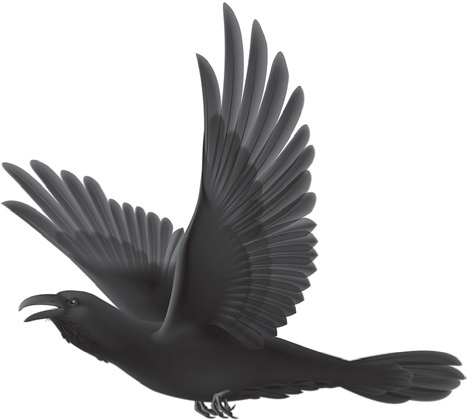
As the crow flies is a nautical phrase that dates to the time of the early English explorers. With few navigational aids and no maps, it was important to be able to find land while at sea. The crow was renowned as an intelligent bird that would always fly straight to the nearest food source, which meant land. Ships would always ensure they had a cage full of crows before they embarked on their journey. A crow would be released from the “crow’s nest” at the top of the mast and the captain would follow the path it took, usually resulting in the fastest route to land.
![]()
MEANING: to supply someone with something they need for a short period
IN CONTEXT: We were able to secure bridge financing to tide us over until our formal loan was approved.
Tide you over has its origins with the sea and, as the phrase suggests, the tide. In the absence of any wind to propel a ship via its sails, captains would use the tide to move the ship. The rising tide was also used to lift a ship over a threatening obstacle, such as a reef or sandbar. The first known usage of the phrase was by the British Captain John Smith in his 1627 book A Sea Grammar, where he wrote “To tide ouer to a place, is to goe ouer with the Tide of ebbe or flood, and stop the contrary by anchoring till the next Tide.” The expression was being used figuratively by the early 1800s.
Between the Devil and the Deep Blue Sea
![]()
MEANING: between two undesirable alternatives
IN CONTEXT: I had a bad toothache, but the trip to the dentist was going to be painful too—I was caught between the devil and the deep blue sea.
Between the devil and the deep blue sea derives from traditional wooden sailing boats. Sailors used hot tar to seal, or caulk, the seams between planks to prevent leaking. The seam between the two topmost planks on the ship’s side was known as the “devil” seam. It was the longest seam and closest to the water, so it needed regular sealing. This required a sailor to stand at the very edge of the deck or even be suspended over the side. If there was a sudden gust of wind or a large swell, the sailor could get knocked over the edge and find himself between the devil and the deep blue sea.
![]()
MEANING: rigidly adhered to; inflexible
IN CONTEXT: The rules for the fire drill were hard and fast and could not be altered.
Hard and fast is a nautical phrase. When a ship has run aground and is firmly beached on land, it is considered hard and fast and is unable to move until the tide comes in. The term was defined in William Henry Smyth’s 1867 nautical dictionary The Sailor’s Word-book as “said of a ship on shore.” The term dates from the 1800s and was used in a figurative sense since that time as well.
![]()
MEANING: an attempt that has little chance of success
IN CONTEXT: He knew her agreeing to come to the dance was a long shot, but he decided to ask her anyway.
Long shot has its origins in naval warfare of the 1800s. Battleships carried cannons as their major weapons. Though very effective when they hit their targets, the cannons were inaccurate and the cannonballs could only travel relatively short distances. For this reason, most battles took place in fairly close quarters. Any shot that was fired at a ship outside the normal range was considered a “long” shot and unlikely to succeed.
![]()
MEANING: well versed in something
IN CONTEXT: He’s been an engineer for twenty years and he really knows the ropes.
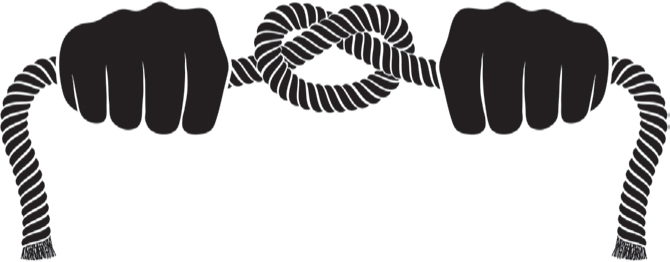
To know the ropes finds its origins with early sailing vessels. The sails on the ships of the 1600s were controlled by a myriad of ropes and knots, which were all connected in a complicated web. Sailors had to learn the intricate rigging required to raise, lower, and maneuver the sails in order to speed up, slow down, and change direction. The ropes were in constant use, and to fully master these tasks took years of experience. It was only then that a sailor could claim to know the ropes. The phrase was being used figuratively by the late 1800s.
![]()
MEANING: a risky or precarious situation
IN CONTEXT: Walter almost didn’t make it through the surgery. It was touch and go there for a minute.
The expression touch and go is another that derives from the sea. When traversing shallow water, a ship’s keel might clip a reef or the seabed. If luck is on the captain’s side, the ship may avoid disaster and move on unaffected instead of being completely grounded—it might touch and go. The saying was explained in William Henry Smyth’s 1867 nautical dictionary The Sailor’s Word-book, where he wrote, “Touch-and-go, said of anything within an ace of ruin; as in rounding a ship very narrowly to escape rocks, &c., or when, under sail, she rubs against the ground with her keel, without much diminution of her velocity.”
![]()
MEANING: in general; on the whole
IN CONTEXT: The final weekend has been wet, but by and large the month has been dry.
By and large is a nautical expression that harks back to the days of sailing ships. To sail “by” means to sail facing into the general direction of the wind, while sailing “large” is the most favorable condition and means to have the wind behind the ship. When the wind was constantly changing around, a captain would be required to sail by and large—both with the wind and against it. By doing this, the ship would continue to progress, but its path was not as direct or accurate.
![]()
MEANING: the absolute end; the last extremity
IN CONTEXT: Tim stayed at the party until the bitter end.
Bitter end is a nautical phrase and has nothing to do with either the taste or the ingredient used in some drinks. Centuries ago, the anchors of sailing ships were fixed to the decks by solid posts. These posts were known as “bitts.” The sailors tied colored cloth to the end of the anchor rope near the bitt so that when the cloth was reached, the men knew they could not let the anchor out any farther. The small area of rope between the cloth and the bitt was called the “bitt end,” which became known as the bitter end. When the rope was let out to the bitter end, it meant that no more rope remained to be used and the water was too deep.
![]()
MEANING: reveal your true intentions or personality
IN CONTEXT: Most people can play the nice guy for a while, but eventually they will show their true colors.
Show your true colors is another nautical expression. In early 18th-century naval warfare, the flag of a ship’s home country was called its colors. Under the Articles of War, published in 1757, ship captains were obliged to run up their country’s flag when going into battle in order to identify the nationality of the ship. But as a method of deceiving the enemy, unscrupulous captains would run up a different flag, perhaps to fool the opposing captain into believing they were an ally. By doing this, the ship was able to get within firing range. With the element of surprise on his side, the captain would only then hoist his actual flag and show his true colors before firing on the enemy to gain an advantage.
![]()
MEANING: without any chance of success; stalled
IN CONTEXT: A hurricane was forecast for the coast, so our plans for a beach holiday were dead in the water.
Dead in the water is a nautical phrase dating to the days before engines were invented. Ships depended on the wind to propel them, and on days when there was no wind to make it come alive, the ship would remain stationary and be considered dead in the water. This had the potential to become a literal expression, particularly if the ship was under attack from the shoreline.
![]()
MEANING: a person who is unpredictable or out of control
IN CONTEXT: You’d better steer clear of Chip when he’s been drinking. He’s a real loose cannon.
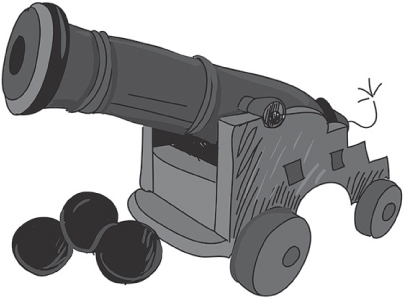
Loose cannon is another sailing-related phrase. From as early as the 1600s, cannons were mounted on the decks of sailing ships and were used as the primary weapon in battles. As they were very heavy, it was essential for the cannons to be firmly secured. This was often done by mounting the cannons on rollers and fastening them down with ropes. In times of rough seas, or as a result of the violent recoil caused by firing the cannons, sometimes a cannon would break free of its restraints. The loose cannons would roll dangerously around the deck, causing damage to the ship and injury to the sailors.
![]()
MEANING: likely to happen soon; imminent
IN CONTEXT: Helen’s interview went very well and she was sure a job offer was in the offing.
In the offing is a nautical expression originating in the early 1600s that came into widespread usage by the late 1700s. The offing is that part of the sea that is visible from, or off, the shore—the area between the shore and the horizon. In other words, a ship that was in the offing was within sight. A lookout who was watching for a ship to arrive would see it approaching when it was in the offing and would know that it would be docking fairly shortly.
![]()
MEANING: silent or lost for words
IN CONTEXT: You’re not saying much there, Bill. Cat got your tongue or something?
Often directed at someone who is silent but expected to speak, cat got your tongue? is the common truncation of “has a cat got your tongue?” While some claim that the saying began merely as an imaginative way of speaking to children, the likely origin stems from the sea. In the 17th century, the British Navy used a whip called cat o’ nine tails for administering physical punishment aboard the ship. The whip was multi-tailed and inflicted incredible pain. When sailors were flogged, the pain was often so severe that it rendered the victim speechless.
![]()
MEANING: to do something correctly or well
IN CONTEXT: Overtaxing the rich will not put the economy on the right track.
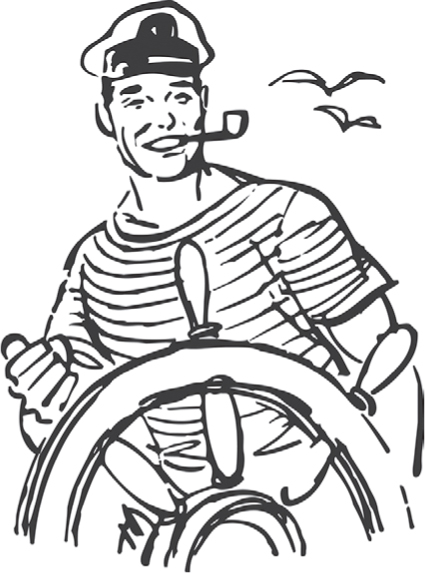
On the right track is an expression that has been corrupted from its original form. It has nautical origins, and was originally on the right “tack.” In order to progress into a headwind, a sailing ship follows a zigzag style of path, angling left to right as it moves forward. This type of course plotting is known as “tacking.” Tacking is a technical art, and a captain must be precise in order to avail himself of the wind. It is important to stay on the right tack because otherwise, the ship will make little or no progress.
Freeze the Balls off a Brass Monkey
![]()
MEANING: very cold weather conditions
IN CONTEXT: It’s almost zero degrees out there, cold enough to freeze the balls off a brass monkey.
Cold enough to freeze the balls off a brass monkey has disputed origins, but the nautical explanation is the most compelling. Naval artillery guns in the 18th century required gunpowder and were manned by so-called powder monkeys who were usually young, agile boys, able to move easily though the tight passages. They would ferry the powder from the ship’s hold to the guns. Next to the guns were brass triangles that supported stacks of cannonballs. By association with the young boys, these became known as brass monkeys. The advantage of brass was that it wasn’t as corrosive as iron, but in cold weather it would contract more than other metals. On particularly cold days, the brass racks would contract, increasing their openings and causing the balls to fall through.
![]()
MEANING: quickly; at a fast rate
IN CONTEXT: The customers were lining up out the door and Bob was making money hand over fist.
Now used primarily in relation to making fast money, hand over fist is an expression with nautical origins. It was originally hand over hand when it began in the early 1700s, and was used to describe the fast progression of a sailor climbing up or hauling in a rope, one hand quickly going over the other. It was later modified to hand over fist, describing the flat hand passing over the fist that clenched the rope.
![]()
MEANING: to knowingly ignore a situation, fact or reality
IN CONTEXT: He always took a long lunch break, but I turned a blind eye because he was such a good worker.
The British Naval Admiral Horatio Nelson is credited with the phrase turn a blind eye. Nelson had one blind eye. During the 1801 Battle of Copenhagen, Nelson and his superior, Sir Hyde Parker, disagreed over the tactics in fighting the large Danish-Norwegian fleet. At one point, Parker sent a signal by way of flags for Nelson to disengage from the battle. But Nelson was confident he could win. He deliberately held his telescope up to his bad eye and said, “I really do not see the signal.” He continued the attack and secured a decisive victory.
![]()
MEANING: success at a difficult task
IN CONTEXT: John passed his final exam with flying colors.
Pass with flying colors is a sailing term that dates back to the early 1700s. A ship’s flag or banner was known as its colors. When a ship or a fleet was successful in battle and was returning to its homeland, it would sail in with its flag flying high on the mast. This indicated that the ship had been victorious: It had retained its flag rather than lost it to the enemy. To pass with flying colors was a sure sign of victory.
![]()
MEANING: keep at a safe distance; avoid
IN CONTEXT: Chad was the meanest guy in the school, so I always gave him a wide berth.
To give a wide berth dates to the 1600s and is another mariner’s term. A berth is a place where a ship is moored at anchor, either in a harbor or out at sea. Once at berth, a ship will then float around with the tide or the wind, but only as far as the length of its anchor rope. When anchoring a ship in a harbor, the best way to prevent it from getting hit by other boats was to give them a wide berth so that they had enough room to move with the tide. Similarly, when maneuvering around another moored vessel, it was prudent to give it a wide berth so as to avoid any collision if it did move with the tide.
![]()
MEANING: fresh and unused; neat and clean
IN CONTEXT: When Fran finished cleaning the house, it was all spick and span.
Spick and span is an expression that originated in the 16th century shipyards. The two words are now obsolete, but at that time a spick was a nail or spike, and a span was a wooden shaving or woodchip. When a ship was brand new and first launching, its nails would be shiny and rust free, and there would still be the odd wood shaving on the deck—it was considered all spick and span.
![]()
MEANING: to engage in a fruitless effort
IN CONTEXT: Tony could not convince the crowd of his point of view, so he decided to stop flogging a dead horse and he sat down.
Flog a dead horse, or beat a dead horse, is a mariner’s term and derives from the “horse latitudes,” an area with irregular and unreliable winds about thirty degrees to either side of the equator. It is an area of high pressure that can result in weak winds and long periods of calm. Sailors were paid an advance wage at the start of a voyage and the time it took to pay the advance off was known as “dead horse” time. Because of the lack of wind, it sometimes took months to pass through the horse latitudes. This was advantageous to the sailors, as they had already received a payment, so they saw little point in working hard to get clear of the area—to do so would have been flogging a dead horse.
![]()
MEANING: to feel unwell
IN CONTEXT: I couldn’t make it into work yesterday as I was a little under the weather.
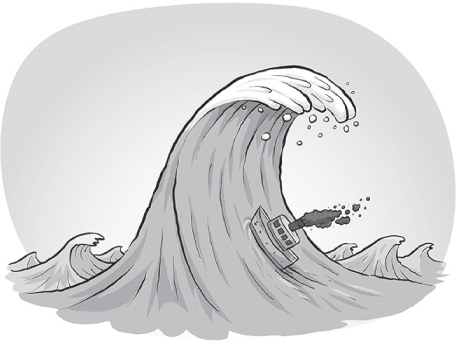
Under the weather is an expression with seafaring origins. Seasickness was a major problem in the early days of sailing before medication was invented to combat it. The ailment was particularly prevalent in times of rough seas and bad weather, when the ship would move about more violently. The greatest sway on a ship is on the deck and the most stable place is underneath near the keel. If a sailor became ill he was sent down below to recover—under the deck, and under the weather.
![]()
MEANING: pass a critical point after a difficult time; begin to recover
IN CONTEXT: Interest rates started to rise as the economy finally turned the corner.
Turn the corner relates to two treacherous oceanic corners—the Cape of Good Hope at the southern tip of Africa, and Cape Horn at the bottom of South America. At both of these capes, two oceans collide and the seas are violent and dangerous. It was always a worrying time when early sailing ships had to negotiate those rough waters, but once the ships had turned the corner, the sailors knew that they were in for some calm, plain sailing.
![]()
MEANING: to feel unmotivated or depressed
IN CONTEXT: I was feeling in the doldrums so I decided not to go to the party.
In the doldrums relates to a region by that name which is located slightly north of the equator between two belts of winds. The winds meet there and neutralize each other, which results in ships becoming stranded and sitting around idly, virtually unable to sail. Many assume that the expression comes from the name of this region, but the region was actually named because of its nature. “Doldrum” comes from the Old English word dol, meaning “dull.” Though the Doldrums is now known as the Intertropical Convergence Zone, the phrase “in the doldrums” has been used in the figurative sense since the early 19th century.
![]()
MEANING: when one becomes rich and successful
IN CONTEXT: When my ship comes in we’ll buy a new house and car.
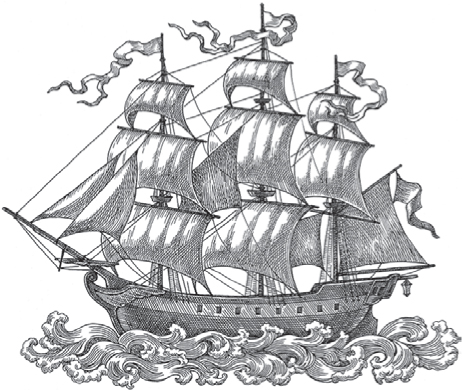
Dating from the mid-1800s, your ship has come in is a seafaring expression about investing in ships. A man might spend all his money in building a ship, fitting it out, and hiring a crew. The ship would then set sail for a long voyage in the hope of recouping the money. It may be away for years at a time and the investor, unable to communicate with the captain, would never be sure if he was going to make any money or even see the ship again. It would only be when the ship reappeared that he would know the outcome. If laden with a cargo of valuables from faraway places, it would be said that his ship had come in.
![]()
MEANING: startled or surprised by a sudden change
IN CONTEXT: I was completely taken aback when Claire left me. I just couldn’t believe it.
Taken aback is a phrase related to sailing. Aback means facing toward the rear, and the sails of a ship are said to be aback when the wind flattens them against the supporting mast. A sudden wind change can slow a ship down, and in some cases drive it backwards. If such a change in wind causes a sailing ship to turn unexpectedly into the wind, the ship has been taken aback. This expression has been used in its literal sense since the late 17th century.
![]()
MEANING: stranded without hope of recovery
IN CONTEXT: By the time I came back from the bathroom all my friends had left the party, leaving me high and dry.
To leave something high and dry is an expression that dates from the early 1800s. It originally related to a ship being run aground and unable to move. This left the ship exposed and vulnerable to attack, and the captain was rendered helpless until the tide came in. Its first written usage was in The Times newspaper in London in 1796, where it was reported that “The Russian frigate Archipelago, yesterday got aground below the Nore at high water, which; when the tide had ebbed, left her nearly high and dry.”
![]()
MEANING: a rogue; usually said to someone in a friendly way
IN CONTEXT: All the girls want you to take them out, you old son of a gun.
Son of a gun has its origins with the sea. Centuries ago, the British Navy allowed women to join sailors on long voyages and live on the ships. Sometimes the women were the partners of the sailors and sometimes they were prostitutes. Pregnancies were common, and most babies were born in a designated area behind the ship’s gun. Many pregnancies were unplanned, and in a lot of instances, the child’s paternity was unknown. In such cases, the child was listed in the ship’s log as the son of a gun.
![]()
MEANING: a quick and easy way to earn money
IN CONTEXT: I got paid to eat at the restaurant and do a report on it for the owners. It was money for old rope.
The expression money for old rope has a nautical derivation. In the 17th and 18th centuries, when sailing ships returned to port, the sailors would assess all the rigging to ensure it was still seaworthy. Any rigging that had been damaged during the voyage would be removed. While unsuitable for sails, some of it would still be in good condition and able to be sold onshore. The more senior members of the crew were given authority by the captain to claim the discarded rope and they were able to profit from its sale, literally making money for old rope.
![]()
MEANING: to display one’s beliefs defiantly
IN CONTEXT: The judge was in the minority, but he nailed his colors to the mast and refused to give an inch.
Nail your colors to the mast derives from naval warfare in the early 18th century. A ship’s captain would enter battle with his flag, or “colors,” flying proudly from the main mast. However, if he wished to surrender, he would lower his colors to announce his position to the enemy. Sailors were also able to lower the flag in times of trouble, so if a captain was determined not to surrender, he would literally nail the flag to the mast so that nobody could lower it and offer a sign of defeat.
![]()
MEANING: very hard rain
IN CONTEXT: It started raining cats and dogs so we had to quickly pack up the picnic and leave.
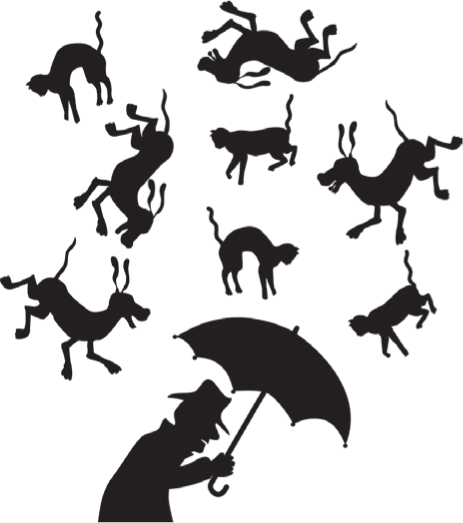
Raining cats and dogs has a number of potential origins, but the seafaring one is the most compelling. According to an ancient nautical myth, it was believed that cats had an influence over storms, while dogs were a symbol of the wind. This belief was held by the Vikings: Odin, the Norse storm god, was frequently shown surrounded by dogs and wolves. This led the early sailors to believe that in any storm, the rain was caused by cats and the winds were brought by dogs. Raining cats and dogs came to refer to any heavy rain.
![]()
MEANING: someone not operating within the rules and getting more than their fair share
IN CONTEXT: The school bursar got sacked because she was on the fiddle and stole some money from the official registers.
Like so many expressions, on the fiddle has nautical origins. The dining tables on ships had raised edges, known as “fiddles,” which were used to prevent the plates from sliding off the table during rough weather at sea. The sailors ate from wooden plates that were built with their own fiddles to stop the food from sliding off them. If a sailor selfishly overfilled his plate so that the food piled up over the edge, it was said that he was on the fiddle.
![]()
MEANING: hurry up, especially in getting out of bed
IN CONTEXT: Adrian was running late for his meeting so I told him to shake a leg.
Shake a leg has its origins with the British Navy in the 19th century. It was at that time that civilian women were first allowed on board Royal Navy ships to boost morale. The sailors would be roused at first light with the cry of “Shake a leg!” This was used to distinguish between the men and the women; if a smooth and shapely female leg was presented as opposed to a hairy sailor’s leg, the lady was permitted to stay in her bunk until all the men were dressed and gone. To this day, shake a leg is still often used in an attempt to hurry a person out of bed.
![]()
MEANING: money that has been put aside to be used for discretionary purposes, particularly in a political context
IN CONTEXT: The candidate had run out of money so the party had to delve into the slush fund.
Slush fund has its origins with the sailing ships of the 17th century. In those days there was no refrigeration, and salted pork was the standard sailors’ fare. To make it more palatable, the pork was boiled up in large pots. Excess fat that rose to the top of the pots would be skimmed off and put into empty barrels. This extra fat was known as slush and the sailors would sell it to soap and candlemakers, sharing the profits to buy luxury items. In 1866 the US Congress applied the term to a contingency fund it had set up, and the term then took on its current meaning.
You Scratch My Back and I’ll Scratch Yours
![]()
MEANING: to do someone a favor if they do one for you
IN CONTEXT: After recommending three new clients to John, he handed me $100 and said with a smile, “You scratch my back and I’ll scratch yours.”
The expression you scratch my back and I’ll scratch yours has its origins with the British Navy. During the 17th century, the punishments meted out to sailors for being drunk, absent, or disobedient were severe. One of the main forms of punishment was a lashing with a cat o’ nine tails, a whip with multiple strands that could inflict brutal gashes on the recipient’s back. The common practice was to tie the offender to the ship’s mast in full view and have him flogged by another crew member. The crew members came to an understanding that they would only deliver light lashes and merely “scratch” the other’s back, knowing that they would receive similar leniency if their turn came to be flogged later in the voyage.
![]()
MEANING: idle, with no plans and nothing to do
IN CONTEXT: I was at a loose end on Saturday night so I decided to go to bed early.
At a loose end derives from tall sailing ships. Where there are sails, there are ropes, and on large ships there are hundreds of ropes. The ropes are essential to ensure the sails are firmly in place, but these ropes can often become loose and unraveled. It is a full-time job to check the ship’s rigging for untied ropes and loose ends. Whenever the ship’s captain found men sitting around doing nothing, he would make them check the ropes—they would find themselves spending hours working at a loose end.